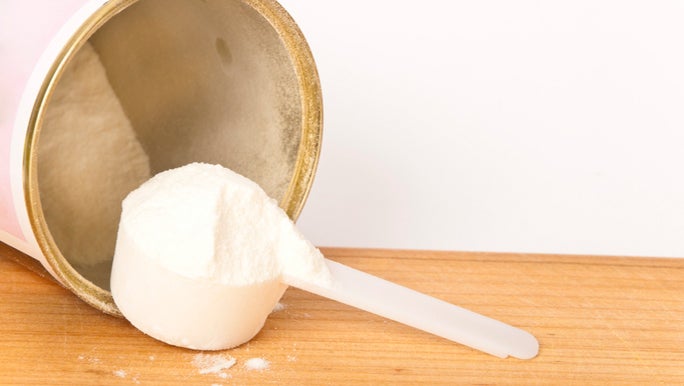Key Points
- Research suggests that supplementing your diet with L-glutamine may benefit people with gut health and mental health concerns.
- When your gut is impacted by sickness, medication or too much processed food, your body recruits more L-glutamine to help keep the gut lining healthy.
- L-glutamine, along with a balanced diet, may help to balance gut flora and reduce symptoms associated with leaky gut syndrome.
When it comes to good gut health, a simple online search or a trip to the health food store can quickly become overwhelming. Wall-to-wall supplements promising gut-busting and flora-balancing benefits can be hard to ignore, but many lack the evidence to support their claims. L-glutamine is one supplement that science says may genuinely support your gut health.
In this article, we explore the benefits, drawbacks and science behind supplementing L-glutamine for better gut health.
What is L-glutamine?
L-glutamine is a form of glutamine, which is one of nine non-essential amino acids produced by the body. As the most abundant amino acid in the bloodstream, glutamine is a building block that works alongside 19 other amino acids to make proteins that help the body overcome trauma, fight illness and support liver and immune function.
L-glutamine exists in two forms: L-glutamine and D-glutamine. L-glutamine is the better known of the two and is a dietary supplement bodybuilders use to build muscle.
So, how do we source L-glutamine?
Our bodies make glutamine, and we also consume it through the foods we eat. A glutamine-rich diet includes foods such as:
- meat
- fish
- legumes
- dairy
- raw cabbage
- beetroot
- whole grains
Research suggests that for those who are deficient, supplementing glutamine may have benefits for gut health and mental health via the gut-brain axis. Scientists continue to study its potential to prevent or treat certain conditions.

L-glutamine may help support gut health
How may L-glutamine benefit gut health?
Glutamine may support gut health in three key ways:
- Balance
It may have a positive impact on sustaining the balance of your gut microbiome.
- Integrity
It may help increase barrier function and integrity of the intestinal lining.
- Inflammation
It may help to minimise the inflammatory response when your gut is irritated by dietary imbalances, allergies or stress factors.
One of the primary roles of glutamine in the body is to support the function of intestinal cells, which may help to lower inflammation and improve digestion. Glutamine is a key nutrient for the intestine, and studies show it uses around 30% of our glutamine stores.
When your gut is stressed from sickness, medication or consuming too many ‘sometimes foods’ (low in fibre and high in saturated fat, sugar and added salt), your body recruits more glutamine to help keep the gut lining healthy and functioning well.
“During times of stress, illness or long-term disease, L-glutamine can become what we call ‘conditionally essential’ in some people,” says Sarah Gray, Registered Pharmacist and Nutritionist. “The body can still produce it but may demand more of it. So in those times, you may benefit from topping up your stores.”

L-glutamine supplements may help support those with leaky gut syndrome
Who can benefit from L-glutamine supplements?
Thanks to its role in supporting intestinal function, glutamine, along with a balanced diet, may help to reduce symptoms associated with leaky gut syndrome and assist in keeping the gut flora healthy.
What exactly is leaky gut?
Leaky gut is a hypothetical condition based on the idea that some people have increased intestinal permeability, which impairs their intestinal barriers, causing them to ‘leak’ water and nutrients. When your intestinal barrier is impaired, it may release toxins into your bloodstream that could trigger an inflammatory response.
According to Sarah, “There is science showing that you might have increased permeability in the gut if you haven’t got enough glutamine in there.”
Can L-glutamine help with IBS?
Despite anecdotal reports claiming that glutamine can help with medically diagnosed IBS and other gut conditions, there is limited research and no clear science in this space.
When to take L-glutamine for gut health
Taking L-glutamine supplements is only recommended in times of need.
“There is no one size fits all approach to supplementing L-glutamine, and we recommend doing so under the guidance of a healthcare professional,” advises Sarah. “No supplement is for life. Needs vary from person to person, and when your gut health symptoms improve, supplements may no longer be needed.”
Are there any side effects of L-glutamine supplements?
L-glutamine supplements may cause side effects, including abdominal upset, constipation, nausea and possible headaches. Speak with your healthcare professional if you experience any prolonged or unusual symptoms.

Speak with your healthcare professional if you’re experiencing problems with your gut health
The takeaway...
So, does L-glutamine help with gut health? Emerging but promising research suggests it may support improved gut function for people experiencing ongoing tummy trouble or leaky gut.
Consuming a glutamine-rich diet, increasing stores during times of stress and making healthier lifestyle choices could set you on the path toward a happier, healthier gut.
Schedule a chat with a healthcare professional if you’re concerned about your gut health.
Related:
Sarah Gray is both a Registered Pharmacist and Registered Nutritionist with a particular interest in health education and helping people to take small steps to big change in their health journey. Sarah is the General Manager Health and Nutrition and a member of the healthylife Advisory Board.
Reviewed by the healthylife Advisory Board March 2023.



